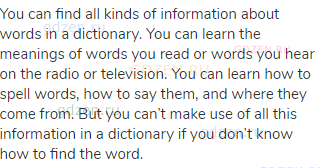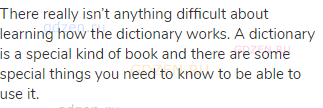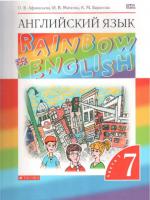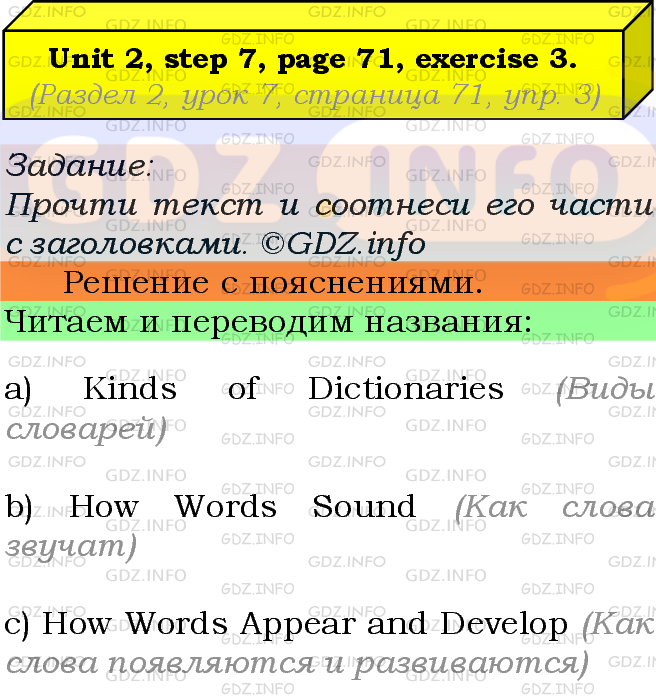3. Прочитайте текст и сопоставьте его части с названиями.
Как использовать словари
1. d) Почему мы используем словари
Все виды информации ждут вас в словарях. Вы можете узнать, что означают слова, как писать слово по буквам, как их произносить и откуда они происходят. Поэтому, когда мы смотрим на слово, мы должны знать, где и как найти нужную нам информацию.
2. а) Виды словарей
На самом деле нет ничего сложного в изучении того, как работают словари. Самые популярные виды словарей одноязычные и двуязычные. Для каждого кто учит английский очень важно иметь возможность использовать одноязычные английские словари.
3. f) Структура словарей
Это то, что вам нужно знать, если вы работаете с одноязычным словарем. Слова, которые вы ищете, — это темно черные, синие или красные буквы. Слова с информацией о них — это словарные статьи. Они следуют друг за другом в алфавитном порядке от A до Z.
4. b) Как звучат слова
После слова многие словари говорят вам, как произносить его. Они показывают это с помощью транскрипции. Они также расскажут вам, к какой части речи принадлежит слово. Например, n (существительное), adj (прилагательное).
5. e) Что слова говорят нам
Затем приходит информация о значении слова. Например, бабуин — большая обезьяна, у которой лицо похоже на собаку. Многие слова имеют более одного значения. Словари дают разные значения под номерами. Например, hand n (кисть) 1. Конечная часть руки 2. Часть часов, показывающая часы (время). Обычно первое значение имеет смысл, который люди используют чаще всего. Некоторые словари приводят примеры использования слов в предложениях. Люди, изучающие языки, считают это очень полезным, потому что такие примеры делают слово более понятным.
6. c) Как появляются и развиваются слова
У многих слов есть интересные истории, чтобы рассказать нам. Некоторые из них приходят на английский язык с других языков. Слова иногда меняют свои значения. Есть словари, рассказывающие об этих фактах. Поэтому словари не только полезны, они могут стать отличной книгой для чтения.
3. Read the text and match its parts with the titles.
How to Use Dictionaries
1. d) Why We Use Dictionaries
All kinds of information are waiting for you in dictionaries. You can find out what the words mean, how to spell them, how to pronounce them and where they come from. So when we look a word up2 we should know where and how to find the information we need.
2. a) Kinds of Dictionaries
There really isn’t anything difficult about learning how dictionaries work. The most popular kinds of dictionaries are monolingual and bilingual. It is very important for every English learner to be able to use monolingual English dictionaries.
3. f) The Structure of Dictionaries
This is what you need to know if you work with a monolingual dictionary. The words you are looking up are in heavy black, blue or red letters. These words with the information about them are word entries1. The entries follow each other alphabetically from A to Z.
4. b) How Words Sound
After the word many dictionaries tell you how to pronounce it. They do it with the help of transcriptions. They also tell you to what part of speech the word belongs. For example, n (noun), adj (adjective) .
5. e) What Words Tell Us
Then comes the information about the meaning of the word. For example, baboon a large monkey that has a face like a dog’s. Many words have more than one meaning. Dictionaries give different meanings under numbers. For example, hand n 1. The end part of the arm 2. A part of a clock that shows hours. Usually the first meaning is the meaning which people use most often. Some dictionaries give you examples of how to use words in sentences. Language learners find it very helpful because such examples make a word’s meaning clearer.
6. c) How Words Appear and Develop
A lot of words have interesting stories to tell us. Some of them come to the English language from other languages. Words sometimes change their meanings. There are dictionaries which tell you about these facts. So dictionaries are not only useful, they can become great reading.
На этой странице вы сможете найти и списать готовое домешнее задание (ГДЗ) для школьников по предмету Английский язык, которые посещают 7 класс из книги или рабочей тетради под названием/издательством «Решебник ГДЗ Rainbow English», которая была написана автором/авторами: Афанасьева. ГДЗ представлено для списывания совершенно бесплатно и в открытом доступе.
- Контрольные работы
- Unit 2
- Вариант 1
- 1
- 2
- 3
- 4
- 5
- 6
Прочитай текст и отметь те утверждения после него, о которых в тексте не упоминается (NS).
Вы можете найти всевозможную информацию о словах в словаре. Вы можете узнать значения слов, которые вы читаете, или слов, которые вы слышите по радио или телевидению. Вы можете узнать, как пишутся слова, как их произносить и откуда они берутся. Но вы не сможете использовать всю эту информацию в словаре, если не знаете, как найти это слово.
На самом деле нет ничего сложного в том, чтобы изучить, как работает словарь. Словарь — это особый вид книги, и есть некоторые особые вещи, которые вам нужно знать, чтобы уметь им пользоваться.
1
Люди могут изучать разные вещи, когда они пользуются словарем.
2
Словари дают информацию о том, как пишутся сложные слова.
3
Детям легко получать информацию о словах из словарей.
4
Словарь — это не обычная книга.
5
Не все словари дают информацию о заимствованиях в том или ином языке.
ГДЗ — «Rainbow English — Контрольные работы»
по предмету Английский язык за 7 класс.
Год издания
2017
Aвторы
Афанасьева О.В., Баранова К.М., Михеева И.В.
Задание
Прочитай текст и отметь те утверждения после него, о которых в тексте не упоминается (NS).
Предмет: Английский язык,
автор: Andreyla85
Ответы
Автор ответа: zajcevadara36287
9
Ответ:
2 не утверждается
3 не утверждается
5 не утверждается
Предыдущий вопрос
Следующий вопрос
Интересные вопросы
Предмет: Українська мова,
автор: artemkuprienko1708
Провідміняти числівник 480
4 года назад
Предмет: Геометрия,
автор: Аноним
Пооооомогите пожалуйста
4 года назад
Предмет: Алгебра,
автор: aaboba883
16/х²-16 +х/х+4 = 2/х-4
ПОМОГИТЕЕ
4 года назад
Предмет: Математика,
автор: 198509171
запишите формулу прямой порпорциональности, график которой параллелен графику функции у =7x+3 y =12x-2
6 лет назад
Предмет: Математика,
автор: danmironov12345
Маша задумала некоторое число и сообщила,что при делении на 20 это число дает остаток 6.Может ли оно при делении на 12 давать остаток? Объсните свой ответ
6 лет назад
Переведите, пожалуйста текст
(1) A dictionary
is a book of information about words. The words are listed in alphabetical order. It shows you how to spell and pronounce words, and gives word meanings. Many dictionaries have other useful information about words, too. They show their parts of speech, examples of correct
usage and give word origins.
In order to be helpful
to you, you must know how to use a dictionary. If you become familiar with how to use a dictionary, you will be able to find the word information you want quickly and easily.
(2) Guide words
are the first and last entry words on a dictionary page. Pen is the first entry on the sample page, and pendent is the last. The other entry words that appear on the
page fall alphabetically between pen
and pendent.
(3) An entry
word is printed in bold type
or heavy type and is divided into syllables by dots. Not all forms of a word appear as entry words. For example, to find out about penciling, you must look under the base word pencil.
(4) The pronunciation of a word is given in (slashed) brackets following the entry. The special symbols used to show you how to pronounce the word are explained at the bottom of the page in the pronunciation key Stress-marks indicate which syllable or syllables to accentuate. A heavy mark is used for primary stress, and a lighter one for secondary stress.
(5) Parts of
speech are indicated by abbreviations. The following abbreviations are used for the different parts
of speech: n. noun; adj. adjective; v. verb; adv. adverb; pron. pronoun; prep, preposition.
(6) Definition is the meaning of
the word. Most words have more than one definition. These are usually labeled
1, 2, 3 and so forth.
(7) A sample sentence is an
example of how the word is used. It can help you understand the meaning of the
word and how to use it correctly.
Read the text and match its parts with the titles.
a) Kinds of Dictionaries
b) How Words Sound
c) How Words Appear and Develop
d) Why We Use Dictionaries
e) What Words Tell Us
f) How They Build Dictionaries
How to Use Dictionaries
1. All kinds of information are waiting for you in dictionaries either in paper or online ones. You can find out what the words mean, how to spell them, how to pronounce them and where they come from. So when we look a word up we should know where and how to find the information we need.
2. There really isn’t anything difficult about learning how dictionaries work. The most popular kinds of dictionaries are monolingual and bilingual. It is very important for every English learner to be able to use monolingual English dictionaries.
3. This is what you need to know if you work with a monolingual dictionary. The words you are looking up are in heavy black, blue or red letters. These words with the information about them are word entries. The entries follow each other alphabetically from A to Z.
4. After the word many dictionaries tell you how to pronounce it. They do it with the help of transcriptions. They also tell you to what part of speech the word belongs. For example, n (noun), adj (adjective).
5. Then comes the information about the meaning of the word. For example, baboon [bəˈbu:n] a large monkey that has a face like a dog’s.
Many words have more than one meaning. Dictionaries give different meanings under numbers. For example, hand [hænd] n 1. The end part of the arm 2. A part of a clock that shows hours. Usually the first meaning is the meaning which people use most often. Some dictionaries give you examples of how to use words in sentences. Language learners find it very helpful because such examples make a word’s meaning clearer.
6. A lot of words have interesting stories to tell us. Some of them come to the English language from other languages. Words sometimes change their meanings. There are dictionaries which tell you about these facts. So dictionaries are not only useful, they can become great reading.
reshalka.com
ГДЗ Английский язык 7 класс (часть 1) Афанасьева. UNIT 2. Step 7. Номер №3
Решение
Перевод задания
Прочитайте текст и сопоставьте его части с заголовками.
а) Виды словарей
b) Как звучат слова
c) Как слова появляются и развиваются
d) Почему мы используем словари
e) Какие слова говорят нам
f) Как составляются словари
Как использовать словари
1. Все виды информации ждут вас в словарях, как в бумажном, так и в онлайн−формате. Вы можете узнать, что означают слова, как их пишут, как их произносить и откуда они берутся. Поэтому, когда мы ищем слово, мы должны знать, где и как найти нужную нам информацию.
2. Нет ничего сложного в изучении работы словарей. Самые популярные виды словарей − одноязычные и двуязычные. Для каждого изучающего английский очень важно иметь возможность использовать одноязычные словари английского языка.
3. Это то, что вам нужно знать, если вы работаете с одноязычным словарем. Слова, которые вы ищите, написаны тяжелыми черными, синими или красными буквами. Эти слова с информацией о них являются словесными записями. Записи следуют друг за другом в алфавитном порядке от А до Я (от A до Z).
4. После слова многие словари говорят вам, как его произносить. Это происходит с помощью транскрипций. Они также говорят вам, к какой части речи относится слово. Например, n (существительное), adj прилагательное (прилагательное).
5. Затем идет информация о значении слова. Например, бабуин − большая обезьяна с лицом, похожим на собачье.
Многие слова имеют более одного значения. Словари дают разные значения под цифрами. Например, hand [hænd] n 1. Конечная часть руки 2. Часть часов, которая показывает часы. Обычно первое значение − это значение, которое люди используют чаще всего. В некоторых словарях приводятся примеры использования слов в предложениях. Изучающие язык считают это очень полезным, потому что такие примеры проясняют значение слова.
6. У многих слов есть интересные истории для нас. Некоторые из них приходят на английский язык из других языков. Слова иногда меняют свое значение. Есть словари, которые рассказывают вам об этих фактах. Таким образом, словари не только полезны, они могут стать отличной книгой для чтения.
ОТВЕТ
1 − d) Why We Use Dictionaries
2 − a) Kinds of Dictionaries
3 − f) How They Build Dictionaries
4 − b) How Words Sound
5 − e) What Words Tell Us
6 − c) How Words Appear and Develop
Перевод ответа
1 − d) Почему мы используем словари
2 − а) Виды словарей
3 − f) Как составляются словари
4 − b) Как звучат слова
5 − e) Какие слова говорят нам
6 − c) Как слова появляются и развиваются
Вопрос 1
Прочитай текст и
отметь те утверждения после него, о которых в тексте не упоминется
(NS)
You can find all
kinds of information about words in a dictionary. You can learn the meanings of
words you read or words you hear on the radio or television. You can learn how
to spell words, how to say them, and where they come from. But you can’t make
use of all this information in dictionary if you don’t know how to find the
word.
There really isn’t
anything difficult about learning how the dictionary works. Adictionary is
special kind of book and there are some special things you need to know to be
able to use it.
Варианты
ответов
- People can
learn different things when they use a dictionary. - Dictionaries
give information about how to spell difficult words. - it’s easy for
children to get information about words from dictionaries. - a dictionary
is not a usual book. - Not all
dictionaries give information about borowings in a language.
Вопрос 2
Используй суффиксы,
чтобы получились новые слова.
1 The sun was
shining in
the sky. (bright)
2 Theirs was a
family. (child)
3
She is a very (beauty) girl.
4
They decide not to go to the (meet).
5
The Mississippi is a (power) river.
6
There are a lot of (home) people in the big cities.
Вопрос 3 используя
Present Perfect, составь
предложения (+,-,?)обращая внимание на наречия
I have
used this information in my lectures (never). —
I have never used this information
in my lectures.
1. We (wash) our jeans (already). —
2. He (decide) to take chicken and rice (just). —
3. He( not plant) any flowers (yet). —
4. they (be) to the museum (already)? —
5. they (speak)
to their parents (yet)? —
6. Linda (see) mountains (ever)? —
7. I (eat) Greek food (never). —
8. You (come) back (just). —
9. She (clean)the windows (already).
Вопрос 4 заполни таблицу
Вопрос 5
Use a/an or no article to complete these sentences.
1. I
have just read such an interesting book! 2. It is such _clear water! 3. Penguins are such_ funny animals!4. Jane has become such _good actress! 5. We
have never been to such _expensive
restaurant. 6.They have never seen such _tall building. 7. It was such_ unusual meeting. 8.
Richard has given me such_ tasty sweets. 9. His was such_
endless speech! 10. It is such _vast territory.
11. You can do nothing with such _children. 12. It
is such_ big money! 13. This is such _helpful information. 14. We are having such_lovely weather today! 15. It is such _lovely autumn day!
Вопрос 6 выбери нужное слово
1.
There are one thousand five hundred and twenty-eight pages in Longman (Dictionary/Vocabulary) of
the
English language. 2. Our physics teacher gave us test papers and asked us to hand them (in/out) on
Wednesday.
3. Could you hand (in/out) these gifts to the children after
dinner? 4. Mrs Thompson looked
through
my notes and handed them (back/out) to me. 5.
«Rebecca, Mr Brian needs a Russian-English dictionary. Can you hand it (out/over) .?» 6. Wherever we go, Paul (borrows/follows) us. 7. The pupil was not sure (of/from) the word spelling. 8. They have never been (in/to) Japan. 9. My little cousin already has the
(dictionary/vocabulary) of 50—60 words. 10. The
details of the future project are not clear.
Would
you like to talk them (in/over) now?
Назад к содержанию
Ответ на UNIT 2, Step 7, Номер 3 из ГДЗ по Английскому языку 7 класс: Афанасьева (Учебник Rainbow)
ГДЗ (готовое домашние задание из решебника) на UNIT 2, Step 7, Номер 3 по учебнику Английский язык. 7 класс. Учебник в двух частях / О.В. Афанасьева, И.В. Михеева, К.М. Баранова. — Дрофа, 2014 (Российский учебник : Rainbow English)
Условие
Read the text and match its parts with the titles.
a) Kinds of Dictionaries
b) How Words Sound
c) How Words Appear and Develop
d) Why We Use Dictionaries
e) What Words Tell Us
f) How They Build Dictionaries
How to Use Dictionaries
1. All kinds of information are waiting for you in dictionaries either in paper or online ones. You can find out what the words mean, how to spell them, how to pronounce them and where they come from. So when we look a word up we should know where and how to find the information we need.
2. There really isn’t anything difficult about learning how dictionaries work. The most popular kinds of dictionaries are monolingual and bilingual. It is very important for every English learner to be able to use monolingual English dictionaries.
3. This is what you need to know if you work with a monolingual dictionary. The words you are looking up are in heavy black, blue or red letters. These words with the information about them are word entries. The entries follow each other alphabetically from A to Z.
4. After the word many dictionaries tell you how to pronounce it. They do it with the help of transcriptions. They also tell you to what part of speech the word belongs. For example, n (noun), adj (adjective).
5. Then comes the information about the meaning of the word. For example, baboon [bəˈbu:n] a large monkey that has a face like a dog’s.
Many words have more than one meaning. Dictionaries give different meanings under numbers. For example, hand [hænd] n 1. The end part of the arm 2. A part of a clock that shows hours. Usually the first meaning is the meaning which people use most often. Some dictionaries give you examples of how to use words in sentences. Language learners find it very helpful because such examples make a word’s meaning clearer.
6. A lot of words have interesting stories to tell us. Some of them come to the English language from other languages. Words sometimes change their meanings. There are dictionaries which tell you about these facts. So dictionaries are not only useful, they can become great reading.
Решение 1
Подробное решение

Белый фонпереписывать в тетрадь
Цветной фонтеория и пояснения
Решение 2
Популярные решебники
Ваше сообщение отправлено
и скоро будет рассмотрено
У нас просто есть деликатесы
29. 29. are you doing (Pres. Cont.); usually visit (Pres. Simple); are leaving (Pres. Cont.)
30. have you had (Pres. Perf); have been working (Pres. Perf. Cont.)
31. do you like (Pres. Simple); have never tried (Pres. Perf); am thinking (Pres. Cont.)
32. have been going (Pres. Perf. Cont.); haven’t lost (Pres. Perf); have been exercising (Pres. Perf. Cont.); have also been (Pres. Perf. Cont.)
33. have Jane and Kate been (Pres. Perf); have known (Pres. Perf); have been sharing (Pres. Perf. Cont.)
34. have gone (Pres. Perf)
Я не имею много денег
Это перевод
Selena Gomez is celebrity.I like her songs.
Curious
…..
Ways
Loving
05.12.2020.
Тест. Английский язык, 7 класс
Внимание! Все тесты в этом разделе разработаны пользователями сайта для собственного
использования.
Администрация сайта не
проверяет возможные ошибки,
которые могут встретиться в тестах.
Контрольная работа 7 класс Rainbow English Unit 2.
Список вопросов теста
Вопрос 1
Прочитай текст и отметь те утверждения после него, о которых в тексте не упоминется (NS)
You can find all kinds of information about words in a dictionary. You can learn the meanings of words you read or words you hear on the radio or television. You can learn how to spell words, how to say them, and where they come from. But you can’t make use of all this information in dictionary if you don’t know how to find the word.
There really isn’t anything difficult about learning how the dictionary works. Adictionary is special kind of book and there are some special things you need to know to be able to use it.
Варианты ответов
- People can learn different things when they use a dictionary.
- Dictionaries give information about how to spell difficult words.
- it’s easy for children to get information about words from dictionaries.
- a dictionary is not a usual book.
- Not all dictionaries give information about borowings in a language.
Вопрос 2
Используй суффиксы -an, -al,-ing, -ly, -less, -tion или приставку un-, чтобы получились новые словаю Впиши ответ ниже.
The sun was shining in the sky. (bright)
Вопрос 3
Используй суффиксы -an, -al, -ing, -ly, less, -tion или приставку un-. Впиши ответ ниже.
Paul has already visited five cities.(Canada)
Вопрос 4
Используй суффиксы -an, -al, -ing, -ly, -less, -tion или приставку un-. Впиши ответ ниже.
Their was a family. (child)
Вопрос 5
Запиши первую, вторую и третью форму глагола кушать на английском.
Вопрос 6
Запиши первую, вторую и третью форму глагола отвечать на английском.
Вопрос 7
Составь предложение из этих слов и запиши его.
has Mike in never swum the ocean.
Вопрос 8
Составь предложение из этих слов и запиши его.
sister my doctorabecomehas.
Вопрос 9
Составь вопросительное предложение из слов и запиши его.
eaten/ has/ Jack/ ever/ burger?
Вопрос 10
Выбери верное наречие.
Jonny has arrived.
Варианты ответов
- yet
- just
Вопрос 11
Выбери правильную форму глагола.
Mrs White just her lunch .
Варианты ответов
- eat
- has eaten
- ate
Вопрос 12
Выбери верный предлог.
Polly says he has never been …… the Moscow Museum.
Варианты ответов
- to
- back
- in
- on
- from
Вопрос 13
Выбери верный предлог.
Mike borrowed pencils …… my friend.
Варианты ответов
- from
- back
- out
- by
Вопрос 14
Выбери верное наречие.
Kate hasn’t told us about her plans ……. .
Варианты ответов
- already
- never
- yet
Вопрос 15
Выбери подходящее по смыслу слово.
When did you buy such a perfeckt …….?
Варианты ответов
- dictionary
- vocabulary
Вопрос 16
Переделай предложение вставив туда наречие и запиши его.
Peter has been in London. (never)
Вопрос 17
Выбери верный предлог.
Steve has developed a real teacher.
Варианты ответов
- on
- by
- into
Вопрос 18
Выбери правильное слово.
The teacher asked his pupils to write new words in their s.
Варианты ответов
- vocabulary
- dictionary
Вопрос 19
Напиши американский вариант слова осень — autumn.
Вопрос 20
Напиши американский вариант слова кинофильм — film.















